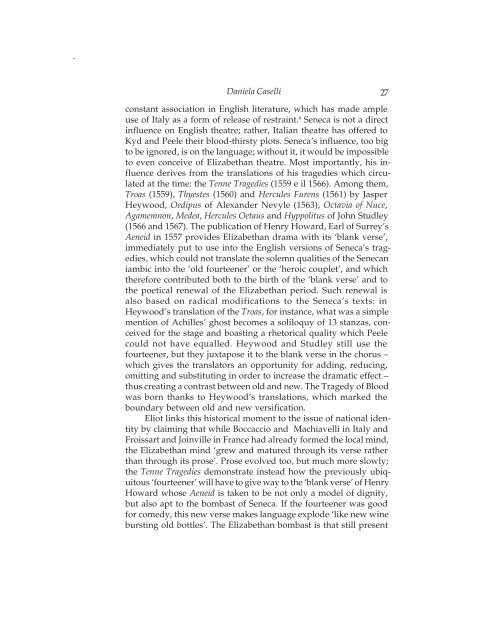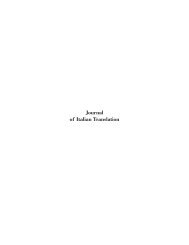Journal of Italian Translation
Journal of Italian Translation
Journal of Italian Translation
You also want an ePaper? Increase the reach of your titles
YUMPU automatically turns print PDFs into web optimized ePapers that Google loves.
Daniela Caselli<br />
constant association in English literature, which has made ample<br />
use <strong>of</strong> Italy as a form <strong>of</strong> release <strong>of</strong> restraint. 6 Seneca is not a direct<br />
influence on English theatre; rather, <strong>Italian</strong> theatre has <strong>of</strong>fered to<br />
Kyd and Peele their blood-thirsty plots. Seneca’s influence, too big<br />
to be ignored, is on the language; without it, it would be impossible<br />
to even conceive <strong>of</strong> Elizabethan theatre. Most importantly, his influence<br />
derives from the translations <strong>of</strong> his tragedies which circulated<br />
at the time: the Tenne Tragedies (1559 e il 1566). Among them,<br />
Troas (1559), Thyestes (1560) and Hercules Furens (1561) by Jasper<br />
Heywood, Oedipus <strong>of</strong> Alexander Nevyle (1563), Octavia <strong>of</strong> Nuce,<br />
Agamemnon, Medea, Hercules Oetaus and Hyppolitus <strong>of</strong> John Studley<br />
(1566 and 1567). The publication <strong>of</strong> Henry Howard, Earl <strong>of</strong> Surrey’s<br />
Aeneid in 1557 provides Elizabethan drama with its ‘blank verse’,<br />
immediately put to use into the English versions <strong>of</strong> Seneca’s tragedies,<br />
which could not translate the solemn qualities <strong>of</strong> the Senecan<br />
iambic into the ‘old fourteener’ or the ‘heroic couplet’, and which<br />
therefore contributed both to the birth <strong>of</strong> the ‘blank verse’ and to<br />
the poetical renewal <strong>of</strong> the Elizabethan period. Such renewal is<br />
also based on radical modifications to the Seneca’s texts: in<br />
Heywood’s translation <strong>of</strong> the Troas, for instance, what was a simple<br />
mention <strong>of</strong> Achilles’ ghost becomes a soliloquy <strong>of</strong> 13 stanzas, conceived<br />
for the stage and boasting a rhetorical quality which Peele<br />
could not have equalled. Heywood and Studley still use the<br />
fourteener, but they juxtapose it to the blank verse in the chorus –<br />
which gives the translators an opportunity for adding, reducing,<br />
omitting and substituting in order to increase the dramatic effect –<br />
thus creating a contrast between old and new. The Tragedy <strong>of</strong> Blood<br />
was born thanks to Heywood’s translations, which marked the<br />
boundary between old and new versification.<br />
Eliot links this historical moment to the issue <strong>of</strong> national identity<br />
by claiming that while Boccaccio and Machiavelli in Italy and<br />
Froissart and Joinville in France had already formed the local mind,<br />
the Elizabethan mind ‘grew and matured through its verse rather<br />
than through its prose’. Prose evolved too, but much more slowly;<br />
the Tenne Tragedies demonstrate instead how the previously ubiquitous<br />
‘fourteener’ will have to give way to the ‘blank verse’ <strong>of</strong> Henry<br />
Howard whose Aeneid is taken to be not only a model <strong>of</strong> dignity,<br />
but also apt to the bombast <strong>of</strong> Seneca. If the fourteener was good<br />
for comedy, this new verse makes language explode ‘like new wine<br />
bursting old bottles’. The Elizabethan bombast is that still present<br />
27

















